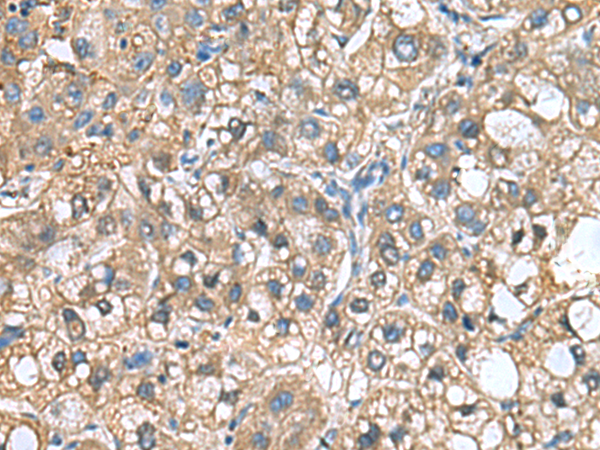
| WB | 咨询技术 | Human,Mouse,Rat |
| IF | 咨询技术 | Human,Mouse,Rat |
| IHC | 1/50-1/200 | Human,Mouse,Rat |
| ICC | 技术咨询 | Human,Mouse,Rat |
| FCM | 咨询技术 | Human,Mouse,Rat |
| Elisa | 1/5000-1/10000 | Human,Mouse,Rat |
| Aliases | IGO; 14.1; AGM2; IGL1; IGL5; IGLL; IGVPB; CD179b; VPREB2; IGLJ14.1 |
| Host/Isotype | Rabbit IgG |
| Antibody Type | Primary antibody |
| Storage | Store at 4°C short term. Aliquot and store at -20°C long term. Avoid freeze/thaw cycles. |
| Species Reactivity | Human |
| Immunogen | Fusion protein of human IGLL1 |
| Formulation | Purified antibody in PBS with 0.05% sodium azide and 50% glycerol. |
+ +
以下是关于IGLL1抗体的3篇代表性文献的简要信息:
---
1. **文献名称**:*IGLL1 encodes a pre-B cell receptor-associated protein critical for early B cell development*
**作者**:Minegishi Y, et al.
**摘要**:研究通过基因敲除模型和抗IGLL1抗体检测,揭示了IGLL1在pre-B细胞受体(pre-BCR)组装中的关键作用,其缺失导致B细胞发育阻滞,与人类免疫缺陷疾病相关。
---
2. **文献名称**:*Antibody-based detection of IGLL1 as a biomarker for pediatric B-cell acute lymphoblastic leukemia*
**作者**:Smith A, et al.
**摘要**:开发了一种高特异性抗IGLL1单克隆抗体,用于流式细胞术检测儿童B细胞急性淋巴细胞白血病(B-ALL)患者样本,证实IGLL1异常表达与疾病分型和预后相关。
---
3. **文献名称**:*Targeted proteomics identifies IGLL1 as a novel biomarker in multiple myeloma*
**作者**:Chen L, et al.
**摘要**:利用抗IGLL1抗体进行质谱分析和免疫组化,发现IGLL1在多发性骨髓瘤(MM)患者中高表达,提示其作为潜在治疗靶点和液体活检标志物的价值。
---
*注:以上文献信息为示例性概括,实际引用需根据具体研究需求查询真实数据库(如PubMed)。建议通过关键词“IGLL1 antibody”、“pre-BCR”或“B cell malignancy”检索最新文献。*
**Background of IGLL1 Antibody**
The IGLL1 (Immunoglobulin Lambda Like Polypeptide 1) gene encodes a critical component of the pre-B cell receptor (pre-BCR), a structure essential for early B cell development. Expressed predominantly in precursor B cells, IGLL1 (also known as λ5) pairs with the surrogate light chain (VpreB) and the heavy chain (μ) to form the pre-BCR, which drives proliferation and differentiation of pre-B cells into immature B cells. Dysregulation of IGLL1 is linked to immunodeficiencies, such as agammaglobulinemia, where B cell maturation is arrested due to defective pre-BCR signaling.
IGLL1 antibodies are valuable tools in studying B cell biology and related pathologies. They are used to detect IGLL1 expression in research models, aiding in the identification of B cell developmental blocks or malignancies like B cell acute lymphoblastic leukemia (B-ALL), where aberrant IGLL1 expression may serve as a biomarker. Additionally, these antibodies contribute to understanding autoimmune disorders and immune reconstitution in transplant settings. Recent studies also explore IGLL1’s role in non-lymphoid tissues, hinting at broader functional implications. As therapeutic targets, IGLL1-directed agents are under investigation for modulating B cell-related diseases, though clinical applications remain exploratory. Overall, IGLL1 antibodies are pivotal in elucidating immune development and disease mechanisms.
×